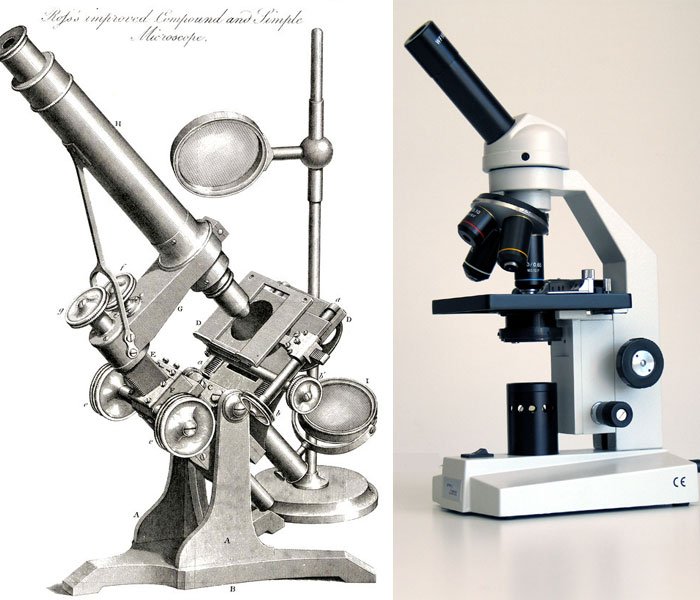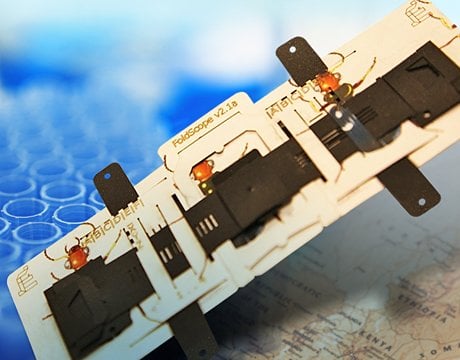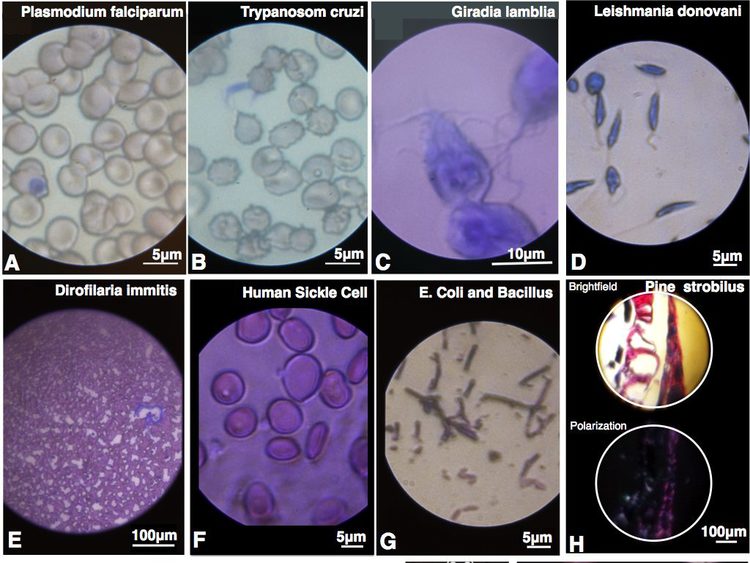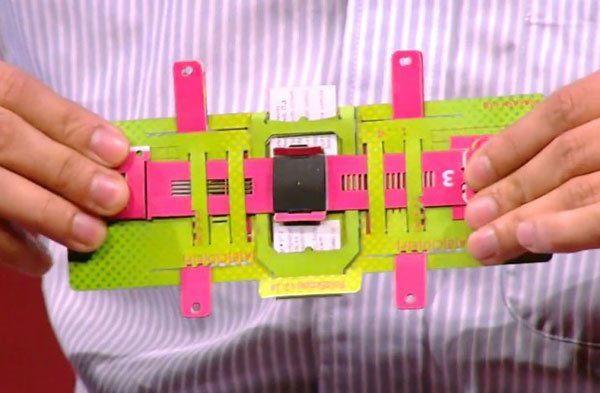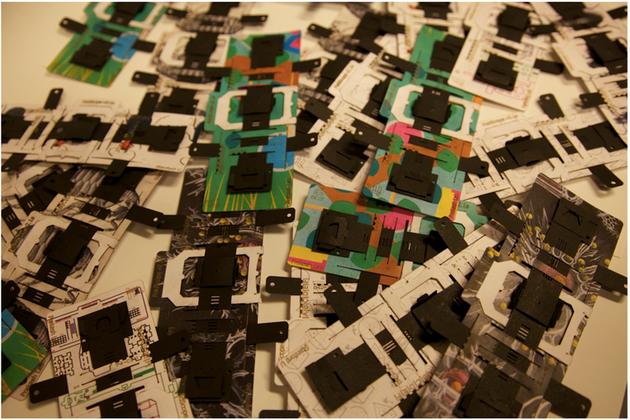Foldscope: Origami-based paper microscope
The idea of an origami microscope may seem completely bonkers but the inspired research team in Prakash Lab in Stanford University, California have made this insane concept a reality.
I came across the video below as I delved into a TED Talks binge (which I highly recommend when seeking daily inspiration) and I was immediately blown away by the concept and plan Professor Manu Prakash and his team presented.
[youtube id=”h8cF5QPPmWU” align=”center” autoplay=”no” maxwidth=”550″]
By combining principles of optical design with origami Prof. Manu Prakash, Jim Cybulski and their team have created something I think can really change the world for the better. A single A4 sheet with in-built lens and LED within perforated pieces which can easily be assembled into a fully functional microscope. They have created a super low-cost product (less than $1 per Foldscope) that is both incredibly portable and durable.
The possibilities for the Foldscope are massive and global.
Optical microscopes, as we know them, have not changed dramatically in the last hundred years. They are heavy, bulky and hard to maintain; they are not designed for field testing and cost thousands of dollars. Foldscopes, basically, have conquered all of these problems. These ingenious paper creations present an affordable brightfield, darkfield or florescence microscope designed for rugged applications in both science and education.
I was always interested in the world of science, thanks to my mother’s inherent enthusiasm in the stars and in nature, but so many children (even in the developed world like the U.S.A., U.K. and Ireland) will go through their entire school experience without using a microscope. What if every child had access to low-cost, durable microscopes from an early age, how many more young people would we have with an interest in science? The more scientists, the better I say.
Malaria alone causes over one million deaths a year and affects over one billion people, mostly in the developing countries around the tropical belt. About 125 million pregnant women are at risk of infection each year; in Sub-Saharan Africa, maternal malaria is associated with up to 200,000 estimated infant deaths yearly. There are about 10,000 malaria cases per year in Western Europe, and 1300–1500 in the United States. A 2012 report in the American Journal of Tropical Medicine and Hygiene, entitled How do we best diagnose Malaria in Africa?, notes “The gold standard test for the diagnosis of malaria is microscopy…[however] microscopy is often unavailable, especially in rural settings”. Disease-specific Foldscopes can increase the availability and amount of microscopy diagnosis carried-out in field testing.
The possibility of a universal “microscope for every child” programme which could foster a deep interest in science from an early age and the global benefits of disease-specific Foldscopes to diagnose the billion people in risk of malaria and other deadly diseases; two very good reasons why this project should be big news in the coming years. I asked Professor Prakash his thoughts on a few aspects of the project:
Me: From a very young age I had a great interest in all things scientific. I remember getting a microscope one Christmas with preloaded slides of insect legs and being blown away with the intrinsic detail at such a microscopic level. This led me into the back garden with jam jars and a magnifying glass in hand to see what other wonders I could find. How important is it to Foldscope to give children the scientific tools from an early age and how do you think you can contribute to the teaching of science in schools and at home?
Manu Prakash: Our vision is that every kid in the world should grow up with a microscope in his pocket; and the entire world of micro-cosmos to explore. Life (and the world of the small) is so incredibly amazing; and holds so many secrets; it’s like a secret door to another world. We want to give the key to this secret door to everybody.
We talk about teaching science and getting kids excited about science ; but we don’t make the magic of science available to everybody in its full glory. This is what we intend to do – for every kid, either in regular school or at home. This requires tools that can scale – an analogy I use is a ball point pen. Imagine if we did not have a pencil or a ball point pen. Not everybody could explore writing/drawing in an explicit way.
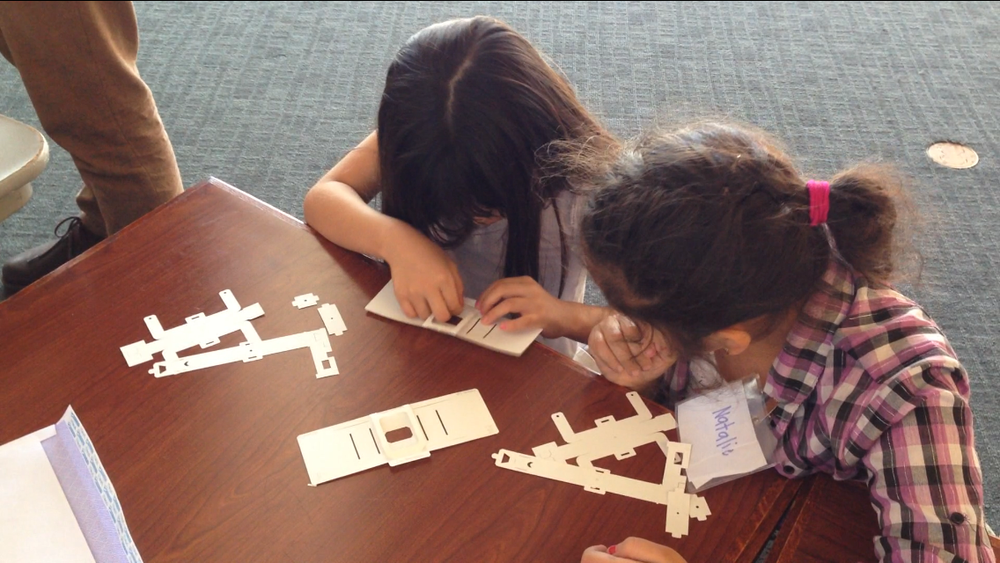
Me: The disease-specific Foldscopes are an important vision for the future of this project. How can the “use-and-throw” aspect of your origami microscopes add to the on-going aid in the developing world?
MP: Diseases have shapes, size and forms. Various specifications are necessary to detect them. Instead of making instruments that have all the bells and whistles; we are trying to make something exactly tuned to a given disease. This is work in progress – but the vision is to make the task as easy as possible for health workers working in field conditions.
We are also implementing several staining protocols, concentration mechanisms directly on the microscopes themselves. This allows us to utilize the modular aspect of the microscopes. You don’t have to throw the entire scope; just the parts that actually handle and work on the samples. Because the design is modular, you can plug and play many parts.
Me: The lightweight and durable nature of the microscope makes it perfect for field work and transportation to remote towns/villages. Did you see this as a requirement when coming up with the idea, to increase mobility while reducing cost?
MP: This was a very stringent requirement even before I started any of this work. It’s extremely valuable for tools to work in conditions they are actually designed to work for. We are focused on field settings because that is unreachable by any other platforms. We can land in a country with thousands of a microscopes (flat packed) – so transportation is very easy. The microscope fits in a regular mailing envelope and can be shipped anywhere using regular mail. The design is focused on constraints; and those constraints enable us to make design choices.
Me: The Ten Thousand Microscope sign-up is now closed. The response from the public seemed immense, what does this mean to you and your team?
MP: Along [with] the microscopes, we are also creating a crowd-sourced biology/microscopy lab manual with participants of all ages/all kinds. In two-three weeks, we have signups from 130 countries in the world. To participate, you need to propose one experiment and document it so anybody can repeat the same. Over the next few months, we will ramp up/scale up to be able to engage this many number of participants. All the experiments will be available as a PDF and on the foldscope website when we make the microscopes widely available as well.
Me: What are your plans for the future and how could we (the public) find out more and get involved?
MP: The best source of information is www.foldscope.com. We are contemplating a crowd-funded scale up and as the time is right; we will be announcing plans online.
Another important source of information is the arxiv paper which has all the details of one-kind of foldscope. This has all the technical details. (Available here: http://arxiv.org/abs/1403.1211)
Me: Once again Prof. Prakash I would like to thank you for your time and I wish you, and your team, all the best with this project in the future. It is a fantastic idea and worthy of much praise.
I would urge you to download the paper above as it really is a fascinating read, especially if you are technologically inclined.
I hope you are as spellbound as I was when first discovering this remarkable project and remember to keep an eye on the project online and through twitter @PrakashLab
This article has been nominated in the ‘Best Blog Post’ category for Blog Awards Ireland. If you enjoyed it, it would be great if you could click on this link and vote for ‘HeadStuff’. Thank you very much.

